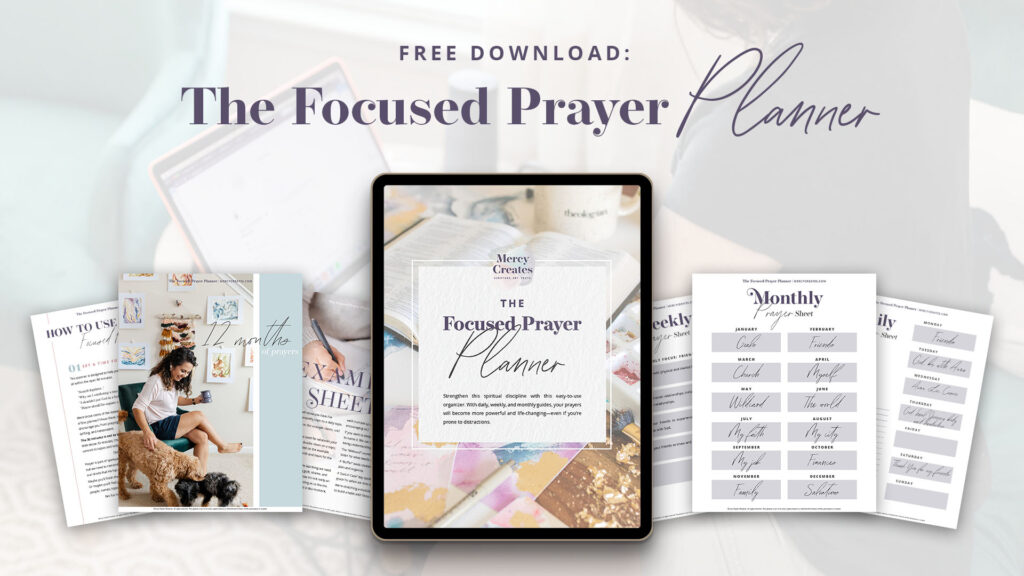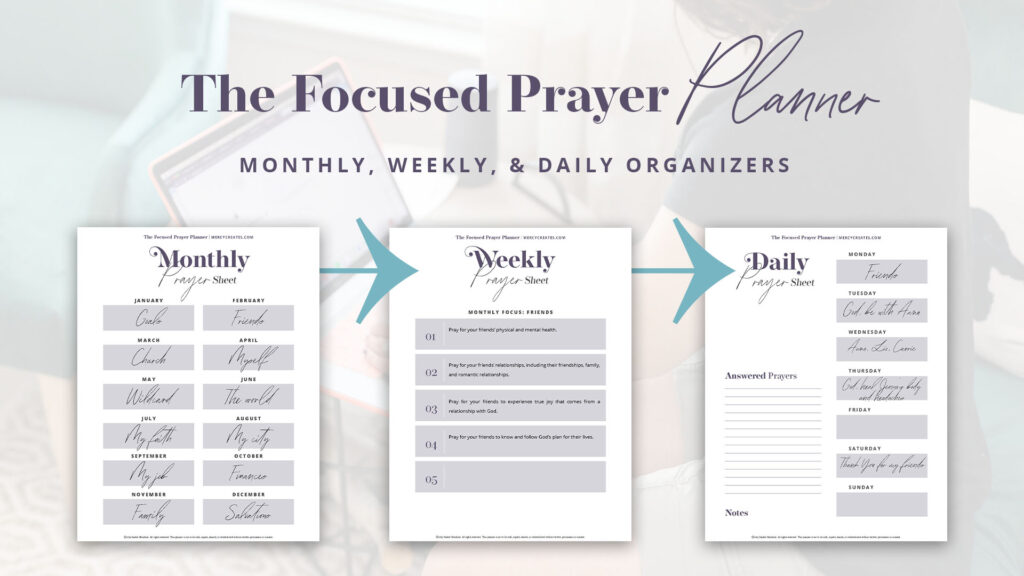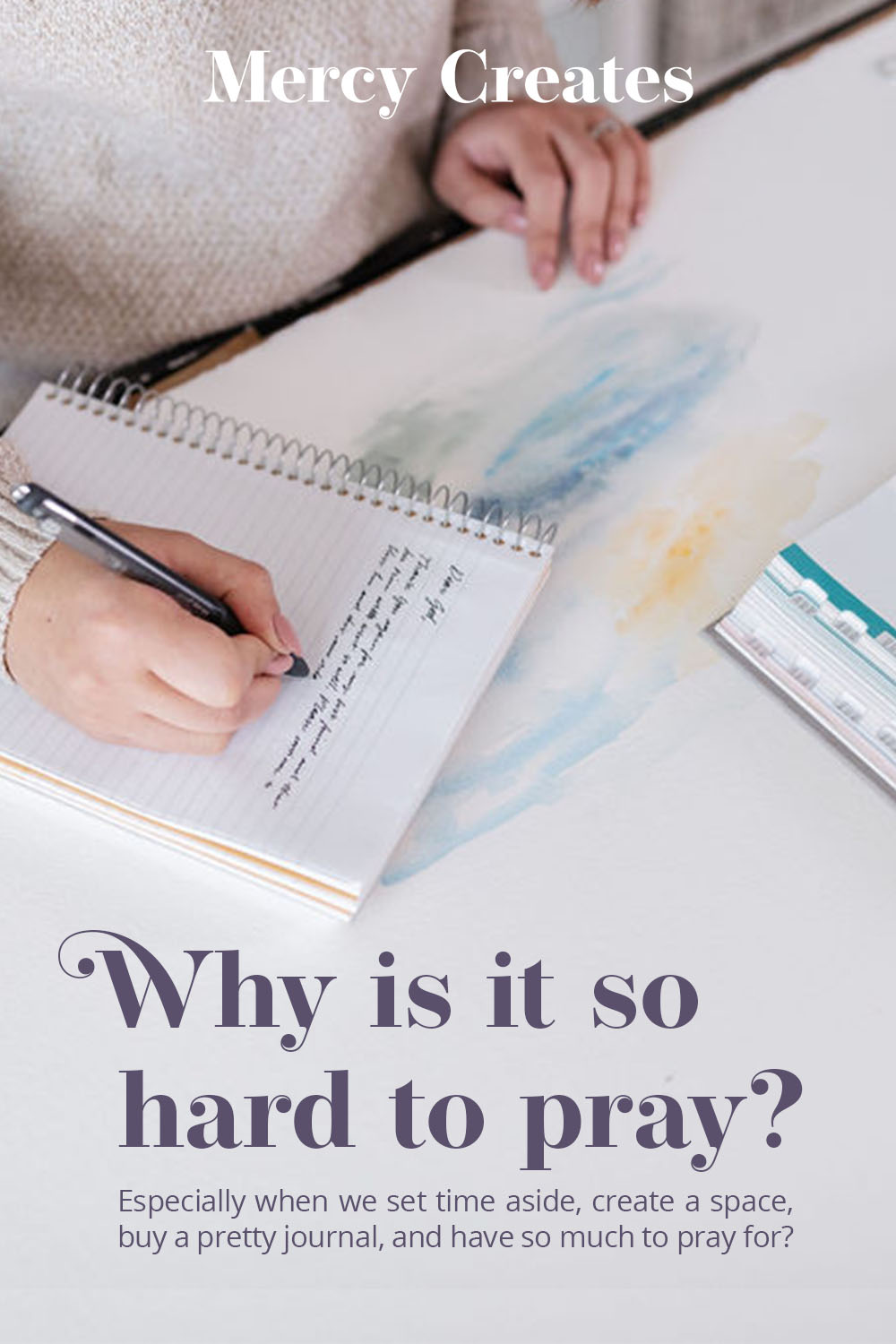Around 55% of men and women have admitted to praying daily*, yet their prayers are only a few seconds to a few minutes long*.
Is there something wrong with a 5-second prayer? Absolutely not.
But what if we increased that 5-second prayer to a 10-second prayer?
What if we really spent full, purposeful, and focused time in prayer?
“The greatest spiritual battle of our generation is being fought between our ears.”
—Jennie Allen: Get Out Of Your Head
TL;DR: Prayer is hard to do but necessary. It becomes easier to do when we have a plan, and we have the free “Focused Prayer Planner” that helps you pray specifics for 12 months, 52 weeks, 365 days. Download here.

In Ephesians 6, Paul lists the armor of God that Christians are to take up and utilize every day:
10 Finally, be strong in the Lord and in the strength of his might.
11 Put on the whole armor of God, that you may be able to stand against the schemes of the devil.
12 For we do not wrestle against flesh and blood, but against the rulers, against the authorities, against the cosmic powers over this present darkness, against the spiritual forces of evil in the heavenly places.
13 Therefore take up the whole armor of God, that you may be able to withstand in the evil day, and having done all, to stand firm.
14 Stand therefore, having fastened on the belt of truth, and having put on the breastplate of righteousness,
15 and, as shoes for your feet, having put on the readiness given by the gospel of peace.
16 In all circumstances take up the shield of faith, with which you can extinguish all the flaming darts of the evil one;
17 and take the helmet of salvation, and the sword of the Spirit, which is the word of God,
18 praying at all times in the Spirit, with all prayer and supplication. To that end, keep alert with all perseverance, making supplication for all the saints.
We are to put on the belt of truth, the breastplate of righteousness, the shoes of the gospel of peace, the shield of faith, the helmet of salvation, and the sword of the Spirit because we are fighting a spiritual battle.
In between Paul listing the items of armor, we read “Stand therefore … in all circumstances … praying at all times…”
The armor of God and prayer are closely interlocked, and they are to be used in all circumstances at all times.
We might be putting on different pieces of the armor God daily (the sword or the helmet), and we might be “using” them for a good part of the day—maybe 20–30 minutes in the morning and evening? …
… but if we aren’t using it in conjunction with prayer, then we’re not really *ready* for the battle. It’s an 85% out of 100%—almost good to go, but not yet.
We know *deep down in our gut* that praying is vital to our lives because
- It deepens our relationship with God
- It keeps our will in line with God’s plans
- It humbles us to God’s providence
- It cultivates a spirit of gratitude
So why is it so hard to pray?
Especially when we set time aside, create a space, buy a pretty journal, and have so much to pray for?
It’s hard to pray because we get distracted.
Does this sound familiar: you start to pray for Aunt Jackie’s knee replacement surgery on Thursday, then your friend Amelia’s migraines to go away, and then your mind starts to walk down the path of tomorrow’s dinner plan… chicken with green beans? Or you could do that new scalloped potatoes recipe you saw on TikTok but maybe you’d rather just hibachi instead, so you don’t have any dishes to clean?

When we’re not focused and let our thoughts wander… They’ll wander and wander and wander straight into picking out an outfit for tomorrow’s meeting with your son’s teacher because you want to look casual and cool but also that you mean business when discussing his mid-term grade.
It’s why we do our best thinking in the shower or on a car ride—we take away the “Thought boundaries” and give our brains permission to go on rabbit trails.
Focusing our prayers on one subject or person at a time can be helpful because that becomes the “Thought Boundary” to allow our thoughts to wander around—like a pen at the zoo. A lion can go hundreds of feet up and down hills, into shallow water, under a tree, wherever all within the confines of his pen. Our prayers can roam wherever all within the space of one subject.
Whether we want to admit or not, we thrive and flourish within boundaries because God knows we’re human and need them.
1 Corinthians 14:33 states “For God is not a God of confusion but of peace.”
The God we serve is not one that enjoys disorder, chaos, or confusion. In Genesis, we read that He made us humans in His image (Genesis 2:7), and I believe that means we have a God-given radar that is sensitive to disorder, chaos, or confusion—we just don’t like it.
Having a focus or a subject to pray for can help lessen those wandering thoughts when we’re actively praying.
It’s hard to pray because we lack a plan.
Honestly, though, it’s hard to do anything in life when we don’t have a plan: the grocery store is dangerous without a list, a house won’t stand without an architect-approved blueprint, and we’re not going to lose weight if we don’t have an exercise and diet regimen in place.
Our culture has moved away from liturgies, creeds, and repetition. We bristle when we’re told to do something “traditional” or “scheduled” because we want our faith to be natural and true.
A “liturgy” is defined as “a form or formulary according to which public religious worship, especially Christian worship, is conducted.”
A “Creed” is defined as “a formal statement of Christian beliefs, especially the Apostles’ Creed or the Nicene Creed.”
There’s a time and place for free-thought prayers, and I believe there’s a time and place for the recitation of an already-created prayer. Both have value, advantages, and disadvantages.
(The temptation is when we don’t pray at all because we don’t want to be full-force on one side of the pendulum or the other side.)
The Lord’s prayer, found in Matthew 6:9–13, is an example of a planned prayer:
9 Pray then like this: “Our Father in heaven, hallowed be your name.
10 Your kingdom come, your will be done, on earth as it is in heaven.
11 Give us this day our daily bread,
12 and forgive us our debts, as we also have forgiven our debtors.
13 And lead us not into temptation, but deliver us from evil.
In this prayer, we see elements of praise, confession, submission, and supplication (asking or requesting).
Jesus created a plan for praying. He gave us instructions for how to communicate with Him—not because He thinks we’re stupid but because He loves us. Jesus Christ knows our limits, knows our desires, and knows we need help. He is eager to hear from us and understands we sometimes feel unequipped or shame. He took the initiative, so we can move forward in communication with Him.
Using a “planned” prayer doesn’t have to be “legalistic.” It can be an act of submission to His knowledge and acceptance of His help.
Focused Prayers are Powerful Prayers
“Prayer is how we isolate the real problems. And prayer is how we get up behind those problems and attack them at the roots. It’s how we isolate the real enemy.”
―Priscilla Shirer, Fervent: A Woman’s Battle Plan to Serious, Specific, and Strategic Prayer
Unfortunately, we’re human. We get distracted. We lose focus. We don’t plan. And we let our attention wander to things that don’t matter.
However….
God is so good and merciful to give us help in communicating with Him. We have endless material to talk to Him about, and He’s given us a framework to pray when we don’t know where to begin.
Prayer is hard. But it is so life-giving. When we focus our prayers and work with a method, our prayer life can grow and flourish.
Any athlete can tell you that the daily and weekly workouts led to their success in their game—they understand the benefits of focused and planned discipline done incrementally over time.
If you’re ready to take control over your prayer life, then grab the free “Focused Prayer Planner” below.

This prayer planner has 1 year of prompts, so you don’t have to stare at a blank sheet and feel your heart rate increase while you get the cold sweats—because the last thing we need is a piece of paper screaming that we don’t know how to pray and should just quit.
It guides you in taking a topic—friendships, for example—and breaks it down into smaller pieces that you can pray over for one week each month:
- Week 1: Pray for your friends’ physical and mental health.
- Week 2: Pray for your friends’ relationships, including their friendships, family, and romantic relationships.
- Week 3: Pray for your friends to experience true joy that comes from a relationship with God.
- Week 4: Pray for your friends to know and follow God’s plan for their lives.
THEN if you want to get even more specific… you can take that weekly focus and create “daily” topics to pray over:

The Focused Prayer Planner is 100% free, and you can download it here.
What Do You think?
Are you excited to focus your prayers and have lists of all the prayers God will answer? Is there someone that comes to mind that would be encouraged by this? Share it with them!


Leave a Comment +